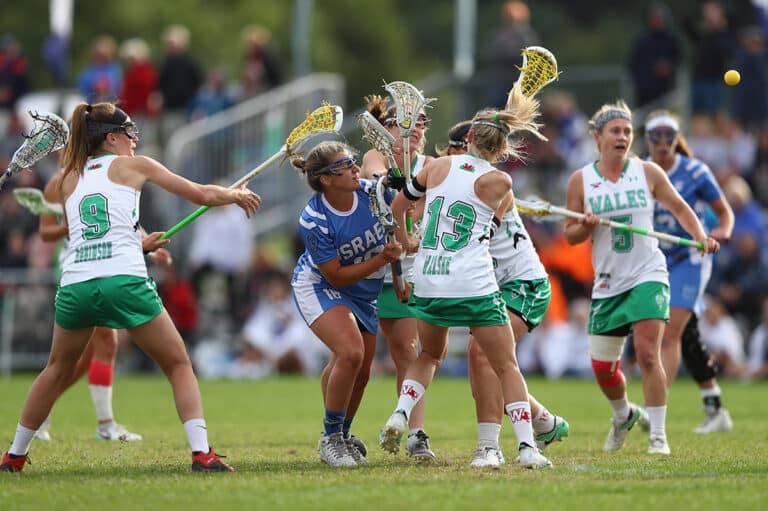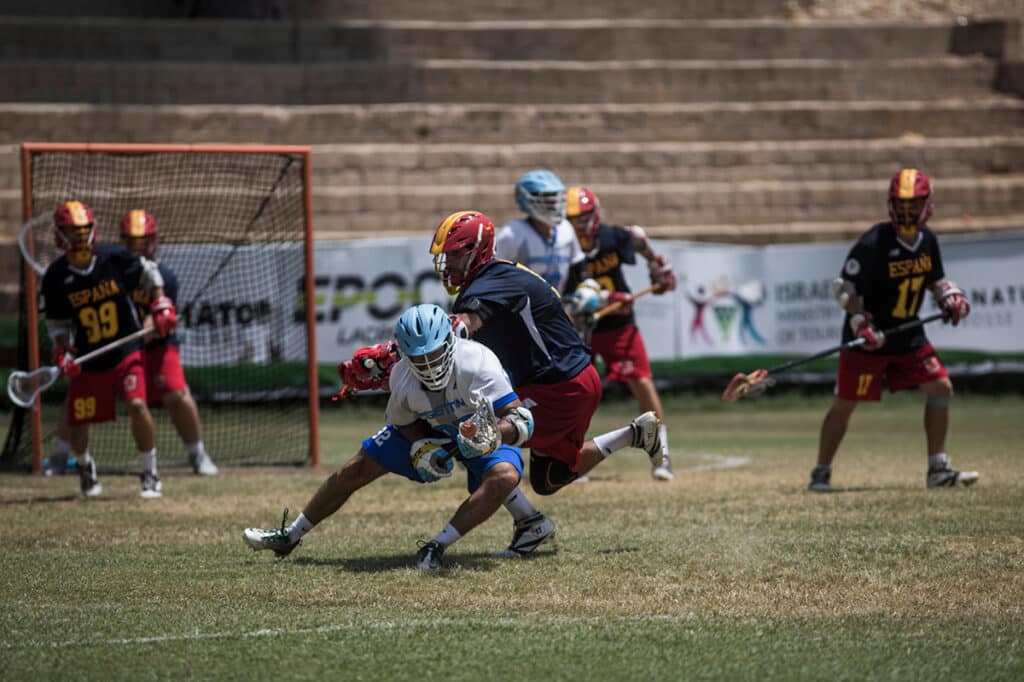
Lacrosse in Israel makes no sense and perfect sense.
The game was first invented around 1100 among the Haudenosaunee (Six Nations Iroquois Confederacy), 5,700 miles from Jerusalem and approximately 850 years before the first Jewish immigrants sailed to North America.
Nine centuries after lacrosse’s birth, it arrived on Israeli shores. Since then, a robust youth system, successful national teams, and a grassroots culture have taken hold.
How did lacrosse come to Israel, and how has the sport flourished in this non-traditional environment?
The origins of Israeli lacrosse
In 2010, Scott Neiss had an idea. While on a Taglit-Birthright trip to Israel, the National Lacrosse League executive realized that Israel could foster a strong lacrosse culture.
Although it was different from the popular sports of soccer and basketball, how difficult could it be to sell a physical, aggressive game built on unity, trust, and creativity to Israelis? After returning stateside, Neiss took a gamble, shipping 20 lacrosse sticks to David Lasday, an American-Israeli he met on his travels. Lasday held a couple of clinics in Tel Aviv’s Park HaYarkon, and lacrosse had officially made it to Israeli sand.
It took some time for operations to ramp up. The first organized lacrosse event in Israel took place in August 2011. The Israel Lacrosse Association (ILA) gained associated membership in the Federation of International Lacrosse, now known as World Lacrosse, that same year. Israel earned its inclusion to the European Lacrosse Federation (ELF) in 2012.
A lot has happened since then. Israel has established national teams, youth development programming, and has hosted multiple major international tournaments. Lacrosse’s 14-year ride in Israel has been anything but dull.
Still, the threefold-strategy of the early days have remained relevant: grassroots growth, attracting the Jewish diaspora, and elevating internationally.

Grassroots growth
Lacrosse came to Israel via clinics geared toward local communities, and that angle never left the ILA.
For more than a decade, the organization has sent teams of coaches into schools across Israel to introduce more than 160,000 of the nation’s youth to the sport. These classes give the kids a new way to exercise, have fun, and discover a hobby that could change their lives. A significant crop of current Israeli-born lacrosse players got their start in an ILA-instructed gym class.
The response has been strong. The youth level has grown to support nine, healthy hubs across the country: Tel Aviv, Herzaliya, Sha’ar Hanegev, Be’er Tuvia, Ashkelon, Kiryat Gat, Netanya, Ashdod, and Be’er Sheva. The ILA focuses many of its youth programs on underprivileged areas in Israel with the goal of providing low-income kids a positive outlet and a sports league they can participate in without being cost-prohibitive.
These city teams practice twice weekly and compete in 12 or more contests per year, allowing the children to represent themselves, their families, and their cities as they sharpen their skills as players and people.
This model helped foster some of the names now seen on national team rosters. See: Ori Bar David.
The Netanya native found lacrosse when former Israeli National Lacrosse Team player Dan Leventhal came to his school with the ILA in the mid-2010s. Fast forward to 2018, and the then-18-year-old became the first Israeli-born player to score in a Men’s World Lacrosse Championship. The kicker? Leventhal, the same man who uncovered lacrosse for Bar David, assisted the teen’s groundbreaking goal years later.
Now, six years on, Bar David is still a member of the Israel Men’s National Team and serves as the Director of Lacrosse Development for the association. His story is one of many on the men’s and women’s sides that started on the ground floor and have become the first generation of Israeli-born laxers.
Attracting the Jewish diaspora
Israeli children can’t magically learn lacrosse on their own, nor can they compete on the international stage from the get-go. It has to start somewhere.
Thanks to Israel’s unique status as a Jewish state and its citizenship laws, the Jewish diaspora has held a major role in the formation and furthering of lacrosse in the country. During the first decade of lacrosse in Israel, many of those involved with the organization were not born in Israel. American Jews in particular are a massive driver for the ILA, financially and physically.
Related: From the pitch to the booth: The untold story of Jews and soccer
The ILA receives funding from the Israeli government, but a sizable chunk of its budget comes from private donations and sports tourism. This money is used for equipment to keep Israeli youth prepared to practice and play, but also to pay for non-Israeli-born lacrosse lovers to move to Israel, coach the children’s programs, and help grow the game.
Israel Lacrosse now offers a gap year program, summer internships, service trips, and a Birthright Lacrosse experience, all aimed at exposing young Jews to Israel, encouraging cultural exchanges between Israelis and Jews from other nations, and enhancing the level of lacrosse in the country.
Since 2011, more than 750 American college and high school students have come to Israel as an ILA intern or on a winter service trip. The association also runs the Israel Premier Lacrosse League, a summer series meant to entice foreigners to pursue lacrosse in Israel. The IPLL has brought over 300 athletes to the country since its inception.
American and Canadian-born Jews have populated most of the senior national team rosters over the years, establishing a footing on the international stage for Israel while the nation’s youth learned lacrosse. But now the kids who were running amuck with sticks in their hands in gym class a decade ago have grown up. As planned, an increasing number of native-born Israelis are breaking into the national teams, especially the U20 squads. A majority of the Women’s U20 team slated to play in the World Lacrosse U20 Championship in Hong Kong in August was born in Israel. The Men’s U20 team, set for the ELF U20 Championship later this month in Poland, is more than 77% Israeli born.
The senior national teams are not yet at that point, but in another 10 years, there are likely to be fewer Jons and more Yonatans on those rosters.
Elevating Israel Lacrosse internationally
There have been 14 World Lacrosse Men’s Championships. The United States has won 11 of them. Canada claimed the other three. Australia is the only other country to have reached the event’s final. The Haudenosaunee are the only other nation to have medaled.
The women’s competition comparably lacks diversity. The Americans earned nine of the 11 Women’s Lacrosse World Cup crowns championships. The Aussies own the outstanding two. England and Canada have appeared and appeased in title clashes, and Scotland won bronze one time 40 years ago.
In short, the international lacrosse elite is a tough ceiling to crack. The top is secure, with gaps arguably insurmountable for nations young in the sport. Israel’s grand unveiling to the globe came at the 2013 World Lacrosse Women’s Championship in Ottawa, Canada. The Blue-and-White placed eighth out of 19 nations, ahead of Japan, Germany, and Ireland — all programs that had between nine and 20 more years of experience as World Lacrosse members.
The men made their debut in 2014 at the World Lacrosse Men’s Championship in Denver, CO. They took seventh out of 38, better again than Japan, Germany, and Ireland. The bar was instantly set.
The Israelis have settled into No. 7 on the men’s side, remaining in that position in 2018 and 2023. The women climbed to No. 6 in 2017 and stayed there in 2022. Both teams have come within touching distance of European trophies, clinching silver medals at the ELF Championships of 2016 and 2019.
Results are one avenue for international legitimacy. The other is hosting, a road Israel has cruised twice.
In 2018, Israel became the first country outside of North America, Europe, and Australia to host a World Lacrosse Men’s Championship. This edition of the event enjoyed the beaches of Netanya as its backdrop, and Israel was under the lacrosse world’s spotlight for the summer. One year later, Europe’s best was once again in Netanya for the Women’s European Lacrosse Championship.
Lacrosse potential in Israel
Fourteen years into this experiment, Israel has welcomed some of the best lacrosse players in the world inside its borders, cemented itself as a top-10 lacrosse nation in both the men’s and women’s games, and steadily fostered a homegrown pool of players that are now coming of age. Could the best be yet to come?
It would take a tremendous decline over the span of decades for the U.S. and Canada to fall from their perch as the premier lacrosse countries on the planet. But the pecking order below has a history of rotation.
The opportunity is there over the next 20 years for Israel to elbow into that conversation. If enough young Israeli athletes are persuaded to pick up sticks and enter under the tutelage of some of the best Jewish lacrosse players, coaches, and teams in the world, then who knows? It takes just one golden generation; then it’s real.


